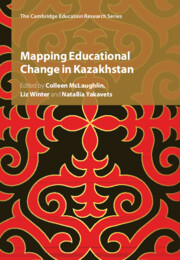Book contents
- Mapping Educational Change in Kazakhstan
- Mapping Educational Change in Kazakhstan
- Copyright page
- Dedication
- Contents
- Figures
- Tables
- Contributors
- Preface
- Acknowledgements
- Introduction
- Part I Foundations of Scaling Up
- Part II Piloting Initiatives and Scaling Up to the Whole System
- Part III Evidence of Implementation
- Conclusions
- 17 Reflections and Pathways
- Select Bibliography: School-Level Educational Reforms in Kazakhstan, 2011–2022
- Index
- References
17 - Reflections and Pathways
from Conclusions
Published online by Cambridge University Press: 09 November 2023
- Mapping Educational Change in Kazakhstan
- Mapping Educational Change in Kazakhstan
- Copyright page
- Dedication
- Contents
- Figures
- Tables
- Contributors
- Preface
- Acknowledgements
- Introduction
- Part I Foundations of Scaling Up
- Part II Piloting Initiatives and Scaling Up to the Whole System
- Part III Evidence of Implementation
- Conclusions
- 17 Reflections and Pathways
- Select Bibliography: School-Level Educational Reforms in Kazakhstan, 2011–2022
- Index
- References
Summary
This chapter is a critical reflection on the reform and its implementation. It looks at the challenges in the past, present and future and some key lessons learned along the way. It examines the changes in the context and the importance of cultural and political factors and what can be learned about implementing large-scale reform, and speculates on the next steps.
- Type
- Chapter
- Information
- Mapping Educational Change in Kazakhstan , pp. 299 - 312Publisher: Cambridge University PressPrint publication year: 2023

